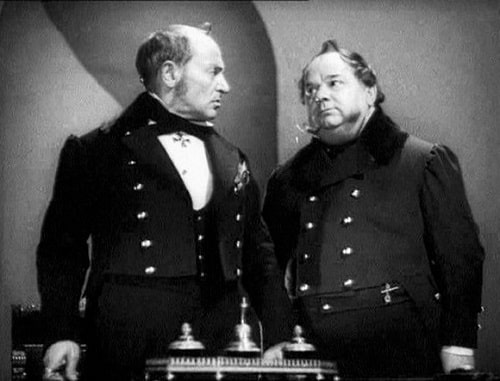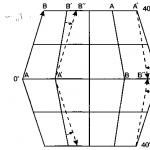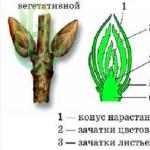Unfortunately, life is often unfair to people. Some can live carefree and secure, without making the slightest effort, while others are forced to work hard to provide themselves with the most necessary things. Just about people of the second type is told in the story of N.V. Gogol's "Overcoat". Its main character, Akaki Akakievich Bashmachnikov, is a typical small, insignificant person in this life.
The basis of the story and a brief history of creation
The story of N.V. Gogol's "The Overcoat" basically contains an anecdote that went around in the circles of clerks. Its essence was this: once there lived a poor official. He had a special passion for hunting, and the thought of buying a good gun was his most cherished dream. Once he decided to make his dream come true - he saved up money and bought the desired gun, but on the very first hunt the official failed: his gun caught on the undergrowth and drowned. No matter how hard the official tried, he did not succeed in catching the weapon. Frustrated, he returned home with nothing. After that, he was attacked by a spleen - he was too sorry for the gun, and the official fell ill with a fever. His friends decided to help and gave him a new gun, which contributed to the recovery of their friend. However, the memory of the loss of his purchase for a long time drove the official into deathly pallor.
The comic basis of the work prompts the reader to perceive the comic reality of the story. And indeed, despite the rather ugly plot, the plot of the story is distinguished by many funny and sometimes ridiculous life situations.
The story of the birth of the protagonist and the choice of name
A certain amount of irony and farce accompanied the main character of Gogol's story from birth. According to the author, this trend began from the very birth of the hero. Chief Goroy was born on March 23rd. The question of godparents had already been resolved. The godfather of the boy was to be Ivan Ivanovich Eroshkin, serving as the head of the Senate, and the wife of the officer, Arina Semyonovna Belobryubykova, was to be the mother. Godparents were chosen in accordance with the requirements of religion - they were respectable people. When the time came to baptize the child, his mother faced an insurmountable obstacle - choosing a name for her newborn.
All possible options from the calendar puzzled her: Mokkiy, Sessions, Khozdazat. Further searches led to the names of Trifiliy, Dula, Varakhasiy. “This is the punishment, what are all the names; I really have never heard of such a thing, ”the woman says. The next attempt was no less successful - the names Pavsikahiy and Vakhtisy were offered to choose from, which also did not impress. The woman decides that there are no other options, she needs to name her son by the name of his father, because "his fate is like that." That is why the newborn boy was named Akaki. The boy was successfully baptized, while the child began to cry as if "as if he had a presentiment that there would be a titular adviser."
You can follow the life and fate in the story of the same name by N.V. Gogol.
His last name was Bashmachnikov. Gogol points out that everything here is prosaic - the surname comes from the word shoe, but neither Akaki himself nor his closest relatives have anything to do with this.
Appearance of Akaky Akakievich
Some time passed, and Akaki became a grown man. We do not know how his childhood and the stage of growing up went. A detailed acquaintance with Akaky Akakievich takes place already in the period of his adult life. At the time of the development of the main actions of the novel, he is in his fifties.
The appearance of Akakiy is not much distinguished and memorable: “short, somewhat pockmarked, somewhat reddish, somewhat even blind-eyed, with a small bald spot on his forehead, with wrinkles on both sides of his cheeks and a complexion that is called hemorrhoidal.”
The reason for such premature old age Gogol calls the "Petersburg climate". This phrase also has a double meaning - on the one hand, it can be taken in its literal sense, denoting the difficulties of adapting the body to certain climatic conditions and, as a result, the impact on appearance and health. On the other hand, this phrase can be taken in an ironic sense.
Life in St. Petersburg was not easy and carefree, especially for a socially and financially insignificant person, which Bashmachnikov was. Significant competition and high demands in work, the specific attitude of people in relation to their personality - all this had an extremely negative effect on people. Just such a context-characteristic of society implies the irony of the phrase.
Akaki's clothes want to be better - his uniform has long lost its colors, collars were always very short, so his neck seemed unreasonably long. His clothes were never perfectly clean. There was always something attached to his suit. Basically it was a thread or a piece of hay.
However, this state of affairs did not bother Akaki. He wanted his things to serve him as long as possible.
Occupation and service of Akaky Akakievich
Akaki Bashmachnikov was a lonely man. He did not have any of his relatives and friends. He also did not have his own housing - he rented an apartment in the poorest part of the city. Bashmachnikov worked as a titular adviser in the department "in order to avoid any trouble, it is better to call the department in question one department." The work of Akaky Akakievich consists in rewriting papers. His salary is 400 rubles, and a bonus is added to this amount - mostly 45-50 rubles, and sometimes even 60.
Akaky Akakievich has been serving in one place for a very long time, so long that no one can remember exactly when he started the service. Bashmachnikov never changed his workplace: "No matter how many directors and all sorts of bosses changed, they all saw him in the same place, in the same position, in the same position."
The lack of promotion does not cause resentment in Akaki. He likes his job. When Bashmachnikov is given the opportunity to go for a promotion, he neglects it. The fact is that Akaky Akakievich can only reproduce the text verbatim, any, even the smallest changes cause him insurmountable difficulties: "No, it's better to let me rewrite something." Since then, they have left it forever to rewrite. Akaky Akakievich finds an inexplicable charm in this occupation, he always starts his work with pleasure. Gogol argues that it is not enough to say that Bashmachnikov zealously does his work, he truly loves her. When he is busy rewriting, a feeling of pleasure freezes on his face. Bashmashnikov has a beautiful, neat handwriting, he scrupulously rewrites documents and never makes mistakes. He is also always at work. His colleagues cannot remember a moment when Bashmachnikov was not at his workplace.
Leisure Bashmachnikov
Akaky Akakievich does not care about his leisure. He is used to spending evenings at home. His favorite pastime is copying papers, he always takes part of the work home with him. If it happened that all his work was done at the workplace, he still took some paper for rewriting just like that, and not because of the need for service.
All his colleagues are trying to go out somewhere, have fun, but such a pastime does not arouse Bashmachnikov's interest, a quiet, calm life, focused on rewriting papers, absolutely suits him. Every evening he falls asleep with happy thoughts about tomorrow's work day and about new documents that need to be rewritten.
The attitude of others to Bashmachnikov
Oddly enough, despite all his zeal for work and diligent performance of his duties, Bashmachnikov does not bother to have a good relationship with himself.

His work colleagues laughed at him all the time and teased him. They discussed rumors about his seventy-year-old mistress and that she was beating Akaky Akakievich.
The authorities also did not appreciate him. The leadership treated him with despotism and indignation, although he, like no one else, performed his work qualitatively.
The watchmen had no sympathy or respect for him either. They paid no attention to him "didn't even look at him, as if a simple fly had flown through the waiting room." And they did not get up when he appeared, as was customary.
Bashmachnikov dutifully endures all ridicule and insults. And only sometimes he pitifully exclaims: “Leave me, why do you offend me?” - and in these penetrating words other words rang: "I am your brother." However, everything remains in its place, the attitude towards it does not change. A certain amount of compassion is shown by his colleagues after Bashmachnikov's overcoat was stolen, they even try to raise money for him for a new one, but they fail to raise the necessary amount.
Characteristics of Akaki Akakievich
Akaky Akakievich Bashmachnikov did not have a strong character. He was a gentle and good-natured man, he did not know how to stand up for himself - neither to give a physical rebuff, nor a moral one. With his appearance, he evokes pity, and the manner of speaking and the plasticity of his movements only reinforce this situation.
Bashmachnikov has a quiet and calm temperament - his voice is also subject to such a characteristic. He speaks measuredly and quietly, does not have eloquence. It is difficult for Akaky Akakievich to express his thoughts clearly, he constantly gets confused in his story and gets lost. Akaky Akakievich spoke for the most part in prepositions, adverbs, and, finally, in such particles that absolutely have no meaning.
Bashmachnikov has a sense of shame. He never uses obscene language or rude words in his speech. Bashmachnikov is not used to being the center of attention, so he feels embarrassed when he pays attention and becomes shy.
The personality of Akaky Akakievich is not of interest. He is a small fry, the loss of which is difficult to notice.
In addition, he is extremely unlucky. He is always a victim of trash being thrown out of the window, so his suit is always soiled, and you can find leftover food or garbage on it.
Overcoat and its role in the life of Bashmachnikov
Bashmachnikov always treated his things with special trepidation. The point here was not that he was a pedant or a man of exceptional purity, but that his life consisted of considerable expenses, and the cost of clothing was too burdensome. Akaky Akakievich urgently needed to update his wardrobe: “It was necessary to get new pantaloons, pay the shoemaker an old debt for attaching new heads to old bootlegs, but he should have ordered three shirts for a seamstress, and two pieces of that linen, which is indecent to be called in a printed syllable.”
Bashmachnikov's overcoat was in a terrible state; she “served also as an object of ridicule to officials; even the noble name of an overcoat was taken away from it and called it a bonnet. The collar of the greatcoat kept being cut off into patches, it seemed that the whole overcoat already consisted of only patches, and the collar was terribly small.
The material of the overcoat was worn out, and from old age it was spreading from any action on it. Finally, a moment came when the overcoat was no longer possible to fix "the cloth was so worn out that it was see through, and the lining was spread out."
Bashmachnikov goes to the master, hoping that he will fix his outerwear, but a miracle does not happen - the master flatly refuses to do anything and claims that it cannot be fixed in any way.
Bashmachnikov has no choice but to save up for a new overcoat. He draws up a plan of action: "it will be necessary to reduce ordinary costs, although at least for a year: to banish the use of tea in the evenings, do not light candles in the evenings." Such measures were not enough to save money, he decides to walk down the street very carefully so as not to erase his shoes, less often resort to the services of a laundress and even starve. "He ate spiritually, carrying in his thoughts the eternal idea of a future overcoat." The accumulation of money for a new overcoat became the goal of Bashmachnikov's whole life. Finally, the dream came true and Akaky Akakievich had accumulated the necessary 80 rubles.
The purchase of the overcoat became the event of Bashmachnikov’s whole life - he carefully hung it, admired the strong fabric and warm lining for a long time, and even “pulled out, for comparison, his old hood, completely spread out.” After buying a new overcoat, Bashmachnikov surprisingly changed "he became more alive, firmer in character, like a man who set himself a goal." Such a seemingly petty event opened up a new Akaky Akakievich to the world. He is able to laugh and joke merrily, enjoy life and even mess around. His colleagues are forcing him to do the unthinkable - to go out to people in the evening. Bashmachnikov agrees. The night city, which he has not seen for many years, seems to him a fabulous place - Akaki is full of admiration. A sudden event changes everything - he got lost in the night streets and became a victim of robbers. The robbers took from him the most precious thing - his new overcoat. Discouraged by this event, Bashmachnikov turns to the police, but does not find support, the attempts of his colleagues to help also do not lead to the proper result. In the hope of a successful turn of events, Akaky Akakievich turns to a certain significant person, but even here he is refused.
Death of Akaki Akakievich
Finally upset Akaki Akakievich falls into a blues, he is overcome by a fever. The humid climate of the city only contributes to the development of the disease and aggravation of its condition.
Perhaps for the first time in his life, he does not go to work. He is in a semi-conscious state and endlessly swears in his delirium, plunging everyone into horror with his condition. Bashmachnikov dies.
After him, nothing remains - all his things were in a terrible state and were of no value.
His death turned out to be unnoticed by anyone - he was too small and insignificant person in this life.
However, after his death, strange things begin to happen in the city. A ghost of Bashmachnikov walks the streets. Once it happened to “a certain significant person” to go not his usual route, suddenly someone stops him: “he noticed a man of small stature, in an old worn uniform, and not without horror recognized Akaky Akakievich in him. The face of the official was as pale as snow, and looked like a complete dead man. The ghost of the dead man makes him take off his overcoat and leaves. After this incident, cardinal changes take place with the official, he ceases to be rude and biased towards his subordinates, to become humane.
Analysis of the image of Bashmachnikov by critics and contemporaries of Gogol
Dmitry Chizhevsky, a literary critic and scientist in the field of literature, drew attention to the fact that the story of N.V. Gogol caused the appearance in literature of a number of works about a “little man” who is not able to change his life and therefore suffers from environmental pressure all his life and circumstances.
Chizhevsky became one of those researchers who debunked the postulate about the bureaucratic component of the story.
D.N. Ovsyaniko-Kulikovsky, analyzing the image of Bashmachnikov, argued that Gogol raised an important topic in the story and drew people's attention to the fact that "there are a legion of such Bashmachnikovs."
Scientists and critics who belong territorially to the Western world have taken a different path of research. They considered the story from the point of view of Hoffmann's theory. So, for example, Yu. V. Mann, drew attention to how crudely and inhumanly sometimes a person's dreams of reality are broken: Akakievich and, moreover, suffering the same inevitable collapse that the dreams of an artist or composer suffered.
Analysis of the image of Akaky Akakievich and the story "The Overcoat" from the point of view of religion
N.V. Gogol was a deeply religious person, so a completely logical explanation, from the point of view of the critic Apollon Grigoriev and Boris Zaitsev, is the need for analysis from the point of view of religion.
In the vision of these critics, Gogol's story is not a humorous story, but a parable, similar in essence to biblical stories. Its essence is the story of the degradation of God's creation - man. Tailor Petrovich, while acting in Gogol's story as a demon, a devil. “In the image of Akaky Akakievich, the poet drew the last line of the shallowing of God's creation to the extent that a thing, and the most insignificant thing, becomes for a person a source of boundless joy and annihilating grief, to the point that an overcoat becomes a tragic fatum in the life of a creature created in the image and likeness of the Eternal” (Apollo Grigoriev).
At the same time, researchers pay attention to the fact that the name of the protagonist is extremely symbolic and corresponds to his essence - in translation, the name Akaki means "innocent, good-natured." In addition, the name of the protagonist is essentially an allusion to the work of John of the Ladder "The Ladder". The protagonist of this work, Akaki of Sinai, a saint revered by Christians, also becomes the subject of ridicule, like Bashmachnikov.
Thus, the main character of the story N.V. Gogol Akaki Akakievich Bashmachnikov is a classic example of an image later called the "little man". He is not able to stand up for himself, his life is devoid of joys and aspirations. He is ready to perform mechanical work and find joy and admiration in this. Bashmachnikov is ready to be content with so little that his joy over such a worthless life seems to be something from the category of absurdity and indecency. However, this image is capable of transformation - small successes significantly transform Bashmachnikov, he opens up to people, and to himself, new facets of his personality, realizes that his life before the changes is not as ideal as he wanted to believe it. At the same time, Akaky Akakievich’s feeling of suspiciousness and weakness does not disappear anywhere - when faced with new troubles, he does not try to resist them - spleen and disappointment lead him to death.
The image and characteristics of Akaky Akakievich in the story "The Overcoat": a description of appearance and character, a portrait in quotations
3.6 (72.63%) 19 votes



